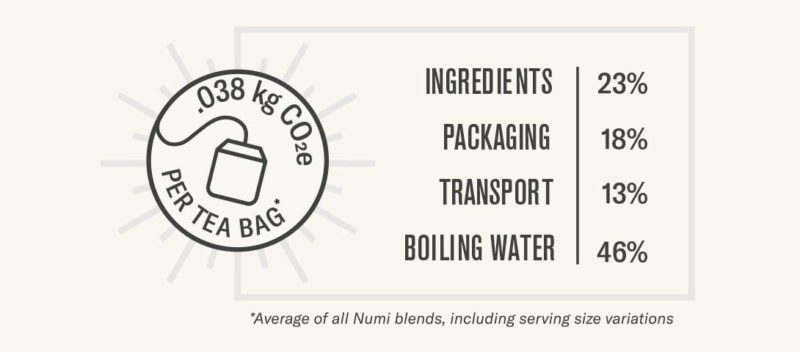by Lillian Luu, SHP Program Assistant
The graphic above is by Numi Tea
In a time when rising global temperatures are causing shortages in the supply chain and disrupting livelihoods and businesses, advocating for carbon footprint reduction is more critical than ever. In the recent webinar, “Carbon Footprint of Tea: A Conversation with Jane Franch of Numi and Kayalin Akens-Irby of Planet FWD,” Jane Franch, Vice President of Strategic Sourcing & Sustainability at Numi Organic Tea, shared her thoughts on how critical it is that companies measure and reduce their carbon footprint. Yet ultimately there is only so much individual companies can do. And so, Jane also emphasized the importance of engaging in advocacy for rapid cross-sectoral decarbonization.
Tea Institute Report on Climate Impacts
Numi first started thinking about climate around 2018 after reviewing a sobering study prepared by the Tea Research Association of India. The study discussed the viability of growing tea in Assam now and in 2050. Most of Numi’s black tea comes from Tinsukia, a small district in northeastern Assam. Presently, Tinsukia has optimal growing conditions for the teas. However, the rising temperatures will completely devastate Tinsukia’s growing conditions, and there won’t be any tea left to harvest by 2050 – if not sooner.
“For us this was this is sobering information,” Jane said. “It hits home on so many levels: as a human being, as somebody working in this industry. There’s a lot to absorb. But it also provides motivation to say that this is the time for us all to understand what our impacts are, how [climate change] will be landing in our supply chains, and what we can do about it.”
In 2018, Numi began investing in measuring emissions. Annually, they go through a mapping process to account for their annual Scope 3 emissions. They review the numbers and develop a plan to reduce where they can and offset the rest.
See the SHP Blog Post, “Measuring Carbon in the Herb Industry” for details on their approach to mapping and reducing their Scope 3 emissions and for information on the tools offered by Planet FWD.
Advocating for Change
Despite these efforts, they understand that they are a small piece of the larger picture, and that consumers, other companies, and government make up the remainder. Advocacy is an essential way to influence action on issues beyond what individual companies can address on their own.
In deciding what action to take, Numi asked: What is most material to our company? Where can we have the greatest impact? Numi honed in on transportation and grid electrification as the two pieces that are most material to their business in terms of their impact in North America. They found they can have the greatest impact by pressuring for grid decarbonization in the United States and Europe since boiling water for tea is 46% of their carbon footprint. That requires advocating for green energy. Also, they can influence impacts of transportation by advocating for more electric vehicles. “Combustion engines and transportation have some of the greatest impacts and so we need to put that at the center as quickly as possible. We need to advocate clean energy policies in the US,” Jane said.
“We can fine tune growing practices for organic specialty crops, but don’t fool yourself to think that that is a climate solution,” she added. “If we fail in the US to get our emission under control, none of the farm level steps we take in the countries of origin will matter. These farmers won’t even be able to grow these crops. They can’t do what they do, and we can’t buy from them.”
Carbon Labeling to Empower Consumers
Carbon labeling provides information regarding the carbon dioxide emissions created as a by-product of growing, processing, packaging, transporting, and disposing of a consumer product. It helps consumers understand the impact of the item they are purchasing or consuming. It can be a tool to consumers develop their carbon literacy.

Numi is committed to giving you the tools to fight climate change, starting with their Carbon Footprint Label.
As Kayalin Akens-Irby, Chief of Staff of Planet FWD, leading carbon management platform for consumer brands, said in the webinar, “Globally we’re dramatically behind on all of our climate goals. Compared to the 90% footprint reduction that we need to achieve by 2050. individuals and as businesses, and we’re really only at 5% against that goal today. We need to dramatically speed things up. Carbon literacy is a huge piece of that equation. People cannot know how to make more sustainable decisions if they don’t have any reference point as to what is more sustainable. Carbon labeling is an opportunity to empower consumers to be part of the solution in general. Overall, consumers are looking for brands to step up and label their products.”
Importance of Action on Local, State, and Federal Level
Jane said, “Having data on how much carbon that boiling water uses on Numi’s label opens up a whole new line of conversation with our consumers around climate, around energy policy, and why energy policy matters [because it makes up 46% of the footprint for one cup of tea]. Consumers might say that nobody in Washington can agree to anything, or what cleaning up our electric grid mean, but when you see the information there, then you understand how that relates to the choices we’re making or maybe not making. Then it becomes really clear why we need transformation on our electric grid and why we need action at the local level, the state level, and the federal level, and we why need our politicians to step up. And we all have something to say about it.”
View Numi’s Carbon Footprint here.
View Numi’s 5-Step Climate Action Plan here.
We Need Bigger Moves
“I’ve come to the conclusion that we can do everything we can but ultimately we need bigger moves.”
-Jane Franch
In the past couple of years, Numi had been actively participating in advocacy within the state government. “It’s been a really positive experience for us,” Jane said. “We were in one call with Gavin Newsom’s office, and one of the staff members said to us, ‘Thank you for being here and filling the space. If you’re not here, we’d be hearing from the people that oppose this work. They’re writing letters, and we’re hearing from them every single day. They’re vocal. We need more companies like yours showing up, writing letters, and voicing your preferences, because that’s what’s used in the halls of Congress to rally support around these initiatives and around these bills.’”
Brands play a bigger role in consumers lives than ever before. We need brands that are willing to stand up and advocate for policy change, brands that are willing to be more vocal and to take risks. At Numi, Jane said, they are “fiercely working at influencing people and politicians” to implement these changes.
They are asking, as we all should be asking, “How can we use our power and influence to fight like hell for a 1.5 degree world?”
Climate Collaborative
More companies are taking action to reverse climate change than ever before. They’re tackling this global challenge not only because it’s essential to the future of our planet but also because doing so offers tremendous opportunities for growth, job creation, and prosperity. At Climate Collaborative, companies can commit to specific climate initiatives. Join their policy initiative to demand bold climate action by the federal government.


Comments